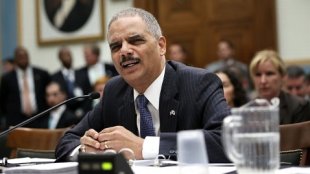More than the Benghazi or IRS scandals, Americans should be alarmed about the Obama administration?s investigations of journalists. Attorney General Eric Holder met off-the-record with some media groups (others boycotted). They spoke of the probes' chilling effect on reporters.
Attorney General Eric Holder appears at a news conference at the Justice Department May 14. Mr. Holder met with media groups yesterday to discuss possible changes to guidelines for investigating reporters. Op-ed contributor Jonathan Zimmerman writes: 'In police states around the world, governments routinely spy on journalists. That?s not the kind of company that America should keep.'
Jonathan Ernst/Reuters
EnlargeDid the White House misrepresent the Benghazi, Libya, attacks to cover up its own ineptitude? Did the Internal Revenue Service purposefully target conservative groups for scrutiny?
Skip to next paragraph' +
google_ads[0].line2 + '
' +
google_ads[0].line3 + '
Subscribe Today to the Monitor
Americans rely on journalists to cast light on these thorny issues. But if reporters can?t do their jobs, everyone else will most likely remain in the dark about serious government mistakes.
That?s why all Americans should be deeply alarmed about the Obama administration?s recent investigations of news organizations, which have drawn far less ink than the Benghazi or IRS scandals. And that?s exactly backward. The most worrisome threat right now is to the people who actually produce the ink: US journalists.
The Obama administration appears to be backpedaling from its overstep since drawing a backlash from media organizations over recent reports about Justice Department investigations of reporters. Attorney General Eric Holder held a meeting with several media outlets yesterday to discuss possible changes to guidelines for the department's investigation of journalists. But several media outlets boycotted the meeting because it was off the record. And at the meeting, media representatives reportedly registered concerns that these leak investigations have had a chilling effect on both reporters and government officials.
In early May, the world learned that the US government had seized the phone records of more than 100 Associated Press reporters, as part of its effort to discover who in government had leaked classified information about a Yemen-based plot to blow up an airliner. Included were five reporters? cellphone lines and ? yes ? three home lines. The AP was informed after the fact, even though it has a history of working responsibly with government on security matters.
White House officials insisted that they had exhausted all other avenues of inquiry before subpoenaing the phone records and that the investigation was necessary to protect national security, which they said was damaged by the leak.
Perhaps it was. But the world will never know that unless Washington allows journalists to follow this story as far as they can. Who else will keep an eye on government? Why should it be trusted, if it resists reporters? scrutiny?
That was the question at the heart of the Pentagon Papers case in 1971, when Richard Nixon?s administration tried to block The New York Times and The Washington Post from publishing classified reports about the war in Vietnam. In a cease-and-desist telegram to the Times, government lawyers asserted that publication of the papers would cause ?irreparable injury to the defense interests of the United States.?
The telegram was mistakenly delivered to a fish company before it found its way to the Times. That was fitting: Almost everything in the government?s case was fishy.
Years later, the lawyer who argued the case admitted that nothing in the Pentagon Papers was damaging to national security. Instead, the Nixon White House was worried that their publication would expose its own lies about the war in Vietnam.
For example, government officials had repeatedly denied any American military activity in Laos. But the Central Intelligence Agency had been running a large covert paramilitary program there, as the Pentagon Papers confirmed. They also detailed the bombing of Cambodia, which the White House had likewise tried to cover up.
Source: http://rss.csmonitor.com/~r/feeds/csm/~3/_S2spu-aEXo/Protect-the-watchdog-press-from-Obama
erika van pelt pat robertson hunger games trailer hunger games trailer in plain sight hunger games movie review bats













